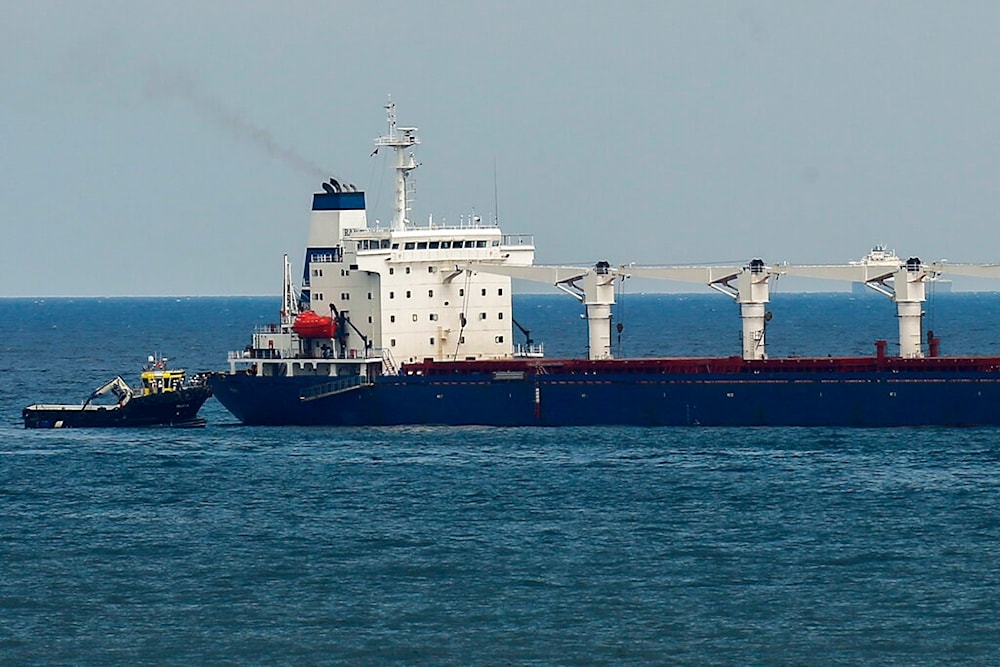US blocks G7 proposal on Russia's shadow fleet task force: Bloomberg
The term “shadow fleet” refers to aging oil tankers that operate covertly to circumvent Western sanctions imposed on Moscow following the start of the war in Ukraine in 2022.
-

A boat with Russian, Ukrainian, Turkish, and UN officials heads to the Sierra Leone-flagged cargo ship Razoni, to check if the grain shipment is in accordance with a crucial agreement signed last month by Moscow and Kiev, at an inspection area in the Black Sea, off the coast of Istanbul, Turkey, on Aug. 3, 2022 (AP)
The United States has rejected a Canadian proposal to establish a task force aimed at addressing Russia’s so-called shadow fleet of oil tankers, as President Donald Trump's administration reassesses its stance within multilateral organizations, Bloomberg reported, citing sources familiar with the matter.
Canada, which holds the rotating G7 presidency this year, is set to host a summit of foreign ministers in Charlevoix, Québec, next week. During negotiations on a joint statement regarding maritime issues, the US has advocated for stronger language on China while seeking to soften references to Russia, according to the sources, who requested anonymity due to the sensitivity of the discussions.
The term “shadow fleet” refers to aging oil tankers that operate covertly to circumvent Western sanctions imposed on Moscow following the start of the war in Ukraine in 2022.
In addition to vetoing Canada’s proposal for a task force to monitor sanction violations, the draft G7 statement reviewed by Bloomberg News indicates that Washington pushed to remove the term “sanctions”, as well as language linking Russia’s ability to sustain its war in Ukraine to its oil revenues, opting instead for the phrase “earn revenue”.
Regarding maritime safety and security, the US sought to explicitly name China, highlighting the alleged risks to “lives and livelihoods” posed by its enforcement of “unlawful maritime claims,” its aerial maneuvers, and its activities in the South China Sea.
G7 communiqués are not finalized until all members reach a consensus, meaning the language could still undergo significant revisions before or during the summit.
However, tensions between the US and its Western allies have deepened. Last month, for instance, the group failed to release a joint statement marking the third anniversary of the war in Ukraine—something they had done in previous years—after the US objected to a strongly worded condemnation of Moscow.
Washington has also resisted references to maritime sustainability and opposed initiatives to create a maritime observatory to track boundary changes—an issue central to global maritime disputes, including in the South China Sea, the sources added.
US diplomats have informed their counterparts that Washington’s inability to support new initiatives stems from its broader re-evaluation of multilateral commitments, the sources pointed out.
Trump’s second term has rapidly overturned long-standing foreign policy norms, prompting allies to seek independent security assurances. European leaders convened in Brussels this week for an emergency summit focused on significantly increasing defense spending, as uncertainty looms over continued US participation in alliances such as NATO.
Reflecting Trump’s impact on traditional US allies, a separate draft of the main communique, also reviewed by Bloomberg, revealed that any mention of "Russian aggression" had been omitted, instead expressing support for “all efforts” toward reaching a ceasefire in Ukraine.
Read more: EU delays exit proposal from Russian energy amid geopolitical shifts

 3 Min Read
3 Min Read









